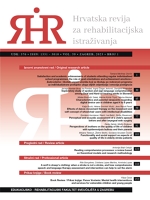Characteristics and parental viewpoints regarding digital device use in children aged 4 to 8 years
Characteristics and parental viewpoints regarding digital device use in children aged 4 to 8 years
Author(s): Matea Bodrožić Selak, Marina Kotrla Topić, Marina MerkašSubject(s): Media studies, Sociology, Family and social welfare, Social Informatics, ICT Information and Communications Technologies
Published by: Sveučilište u Zagrebu, Edukacijsko-rehabilitacijski fakultet
Keywords: children; parents; digital device use; motivation; risks; benefits; smartphone;
Summary/Abstract: In the present digital age, the number of digital devices and media has multiplied, giving young children and their parents access to them anytime and anywhere. The family and home environment constitutes an important ecological context for fostering and supporting the development of safe online behaviour, as well as preventing risky online behaviour in young children. During childhood, parents play an influential role in shaping a child’s use of digital technology (DT) devices through parental practices that are shaped by their beliefs about DT. The first aim of this study was to describe preferred digital devices, activities, and emotional states related to digital device use among children aged 4 to 8 years. The second aim was to describe parental viewpoints about their children’s device use. The data was collected through online interviews with 31 children (16 girls), aged 4 to 8 years, and one parent of each of the children included in the project “Digital technology in the family: patterns of behaviour and effects on child development”. The results show that smartphones are the children’s favourite device and playing video games is their preferred digital activity. Most children reported feeling happy when they used DT devices, as well as feeling sad and angry when they had to stop using them. Parental motivation for providing children access to DT devices can be childand parent-oriented. Parents frequently emphasised the educational aspects of their children’s device use, but they were aware of the negative and positive effects on the children’s functioning. The findings indicate that children’s daily context of living in association with DT usage is characterised by small, portable devices that are used mainly for entertainment. Additionally, their parents allow the use of such devices because they believe that DT can have a positive impact on child development, and they need to occupy children’s attention in specific situations. However, DT device usage is limited due to the awareness of the negative impact on child development.
Journal: Hrvatska revija za rehabilitacijska istraživanja
- Issue Year: 59/2023
- Issue No: 1
- Page Range: 45-58
- Page Count: 14
- Language: English

